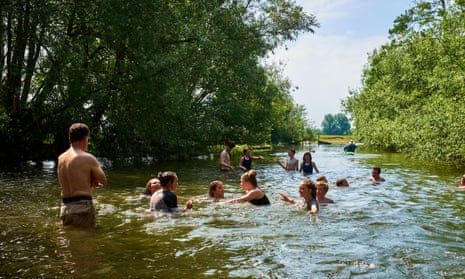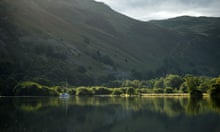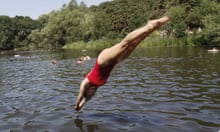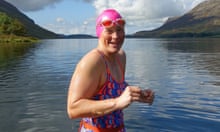Swimmers in the UK hoping to enjoy waters certified clean and healthy this summer have been let down again. Only 110 coastal and inland sites were judged excellent in the latest bathing water quality data from Europe’s environmental watchdog.
Most of the UK’s bathing sites were not classified in 2020, however, because Covid-19 restrictions prevented sampling. This meant that out of 640 sites, 457 received no verdict in the rankings, compiled annually by the European Environment Agency and published on Tuesday.
Twelve sites where a verdict could be delivered were found to be poor, 29 of sufficient quality and 32 good.
The lack of data pushed the UK to the bottom of the European league table, rivalled only by Poland, where just 22% of sites were rated excellent, in the 31-country rankings of EU member states plus Albania and Switzerland. The other 29 countries all had at least 50% of the monitored bathing sites classified as excellent quality, and for the vast majority – 24 countries – the figure was at least 70%.
Cyprus, Greece, Malta, Croatia and Austria led the pack with 95% or more of their sites qualifying as excellent. All of Cyprus’s sites received top marks.
The 2020 data will be the last to include the UK. The EEA includes EU member states and non-members such as Turkey, Iceland and Switzerland, but the UK has chosen to opt out of EEA membership post-Brexit, meaning no such comparisons will be possible in future.
The UK has performed poorly in bathing water quality for years, regularly appearing near the bottom of the table while other countries, including eastern European states, have made marked improvements.
A Guardian investigation last year found that water companies had poured raw sewage into rivers on more than 20,000 occasions in 2019, and dumped thousands of tonnes of raw sewage on beaches.
A government spokesperson said: “The quality of bathing waters in England has improved significantly in the last 20 years. The latest data from 2019 shows that that 72% achieved the highest standard of Excellent, while 98.3% passed the minimum standard.
“Visitors to coastal and inland swimming spots have over 400 bathing waters to choose from and can find out more information of the Environment Agency’s ‘Swimfo’ website.”
Overall, the EEA said 83% of coastal and inland sites around Europe were found to be excellent in 2020, broadly in line with recent years. Only 1.3% of the sites tested, or 296 across the continent, were judged to be of poor quality, down from about 2% in 2013. Coastal sites fared better than inland sites, with 85% and 78% respectively classified as excellent.
About 6% of the sites normally monitored across Europe could not be reached because of Covid-19 restrictions. Countries also tend to leave out many bathing sites that are used in practice, so the true picture could be different, especially for inland sites, and people could be put at risk if the bathing places they use are not monitored.
Lidija Globevnik, a project leader for bathing water at the European Topics Centre and an author of the report, said: “There are many sites that are not identified as bathing waters, but people still swim there. There should be higher attention paid by the authorities to observe these sites, and act if there is a problem.”
She said the climate crisis was also having an impact on bathing water and on inland sites especially, because dry spells reduce the amount of water in rivers and lakes, which could concentrate pollutants from agricultural runoff and other sources.
“There is not enough water in some places, which means a proliferation of bacteria in inland waters and higher risks,” she said. “This can be managed better through looking at agriculture, hydrology and water extraction. These all need to be carefully managed.”
The European Commission has recently launched a review of the bathing water directive as part of its zero-pollution action plan. The current rules could be updated, and an online public consultation is planned for suggestions on the improvements needed.
Virginijus Sinkevičius, the European commissioner for the environment, fisheries and oceans, said: “Bathing water quality in Europe remains high and it’s good news for Europeans who will be heading to beaches and bathing sites this summer. This is the result of more than 40 years of the bathing water directive, hard work by dedicated professionals and cooperation. The zero pollution action plan adopted in May will help to keep the waters healthy and safe, and our seas and rivers clean.”
The Covid-19 pandemic had no impact on the quality of water, but led to many bathing sites being closed or access limited because of social distancing requirements, although many people were driven to take up wild swimming.
Hans Bruyninckx, the executive director of the EEA, said: “The quality of European bathing water remains high after four decades of action aimed at preventing and reducing pollution. EU law has not only helped raise the overall quality, but also helped identify areas where specific action is needed.”










